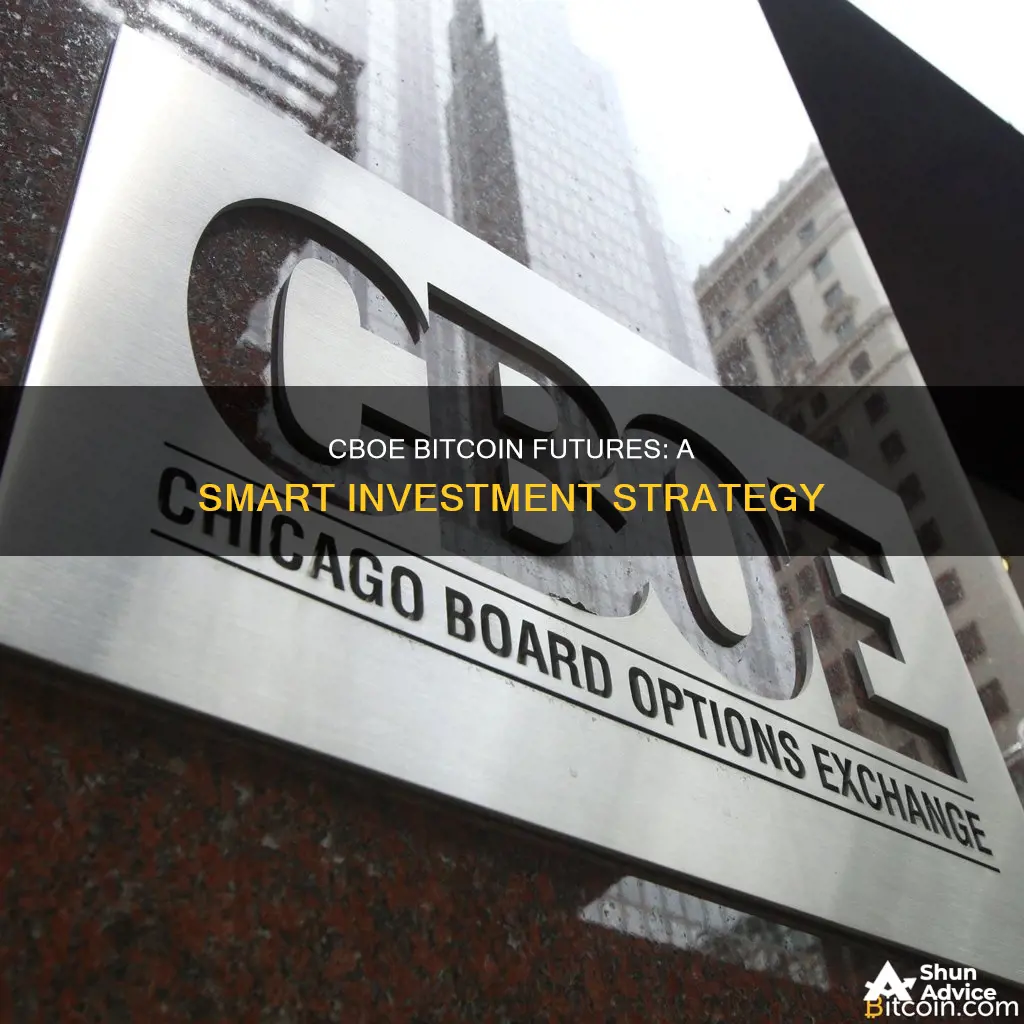
Bitcoin futures are contracts between two investors who bet on the cryptocurrency's future price, allowing them to speculate without purchasing. CBOE Bitcoin futures are traded on the Chicago Board Options Exchange (CBOE) and were first introduced in 2017. Each contract covers a single bitcoin and is cash-settled, meaning no bitcoin changes hands. The CBOE sets margin requirements and trading halts to limit volatility. Trading hours are Monday to Friday, 8:30 a.m. to 3:15 p.m. CST, with extended hours on weekdays and Sundays. Investors need a futures account with a broker to trade CBOE Bitcoin futures.
| Characteristics | Values |
|---|---|
| Launch Date | 10th December 2017 |
| Launch Time | 5 p.m. CST |
| Bitcoin Amount per Contract | 1 bitcoin |
| Expiry Dates | Up to four weekly contracts a month into the future, three near-term monthly contracts up to three months into the future, and quarterly contracts at three-month intervals in March, June, September, and December |
| Settlement Type | Cash-settled |
| Final Settlement Value | Equal to the official auction price for bitcoin as determined by the Gemini Exchange, rounded to the nearest $0.01 |
| Initial Margin Requirement | 30% |
| Trading Halts | 2-minute halt if the contract price moves more than 10% in either direction from the previous day's settlement price; 5-minute halt in the event of a 20% move |
| Regular Trading Hours | 8:30 a.m. to 3:15 p.m. CST Monday through Friday |
| Extended Trading Hours | 3:30 p.m. to 8:30 a.m. on weekdays, 5 p.m. Sunday afternoon through 8:30 a.m. on Monday morning |
| Transaction Fees | $0.25 to $0.50 per contract side |
What You'll Learn

CBOE Bitcoin futures trading halted in 2019
CBOE Bitcoin futures trading was halted in 2019 due to waning interest and slumping volumes. Cboe Global Markets, which launched the first bitcoin futures contracts in the US in December 2017, announced in March 2019 that it no longer planned to offer bitcoin futures contracts. This decision came as interest in cryptocurrency trading dried up since the 2017 mania, causing a crash in the price of bitcoin.
Cboe's bitcoin futures contracts were aimed at making it easier for investors and speculators to trade the new asset class and build liquidity in the underlying product. However, with the decline in interest, the exchange operator decided to reassess its plans for trading digital asset derivatives.
The Chicago-based company's decision to halt trading in bitcoin futures highlighted the cooling enthusiasm for bitcoin after the all-out mania in 2017. When the "XBT" futures were launched, bitcoin was trading near $17,000 and soon shot up to almost $20,000. By 2019, prices had crashed by 80%, with bitcoin trading at around $4,000.
While Cboe was the first US exchange to introduce bitcoin futures, it was not the only one. Its rival, CME Group, also debuted bitcoin futures contracts in December 2017, which have historically seen more trading volume. CME's version consists of 5 bitcoins, while CBOE's contract has one bitcoin.
With the halt in CBOE bitcoin futures trading, investors seeking to trade bitcoin futures would need to explore other options, such as CME Group's offering or other cryptocurrency exchanges.
A Smart Guide to Investing $15 in Bitcoin
You may want to see also

CBOE Bitcoin futures contract covers a single bitcoin
The CBOE Bitcoin futures contract covers a single bitcoin. This is in contrast to the CME contract, which consists of 5 bitcoins. The CBOE contract will be worth the price of bitcoin on the Gemini exchange at the time of trading. This is because CBOE will price the contracts with a single auction at 4 pm on the final settlement date, using bitcoin prices from the Gemini exchange.
CBOE Bitcoin futures are traded on the Chicago Board Options Exchange (CBOE), which is the first regulated U.S. exchange to offer both spot and futures markets on a single platform. CBOE Digital, the crypto arm of CBOE, listed margined bitcoin (BTC) and ether (ETH) futures in January 2024, after receiving CFTC approval.
Margined futures allow traders to use leverage to take a position that exceeds the size of their collateral, whereas regular futures do not. This means that traders can take advantage of the price trajectory of an underlying asset, in this case, bitcoin, without needing to purchase it.
CBOE Bitcoin futures are cash-settled, meaning they are settled in U.S. dollars, as opposed to bitcoins. The minimum tick for a directional non-spread trade is 10 points or $10. A spread tick has a tick size of $0.01.
A Guide to Bitcoin Investment in Uganda
You may want to see also

CBOE Bitcoin futures are cash-settled
CBOE Bitcoin futures are also margined futures, meaning that investors must deposit a certain percentage of the contract amount in their margin account and can finance the rest of the contract purchase by using leverage. For example, the CME Group Bitcoin futures contract requires a 50% margin of the contract amount.
CBOE Bitcoin futures are traded on the Chicago Board Options Exchange (CBOE), which is owned by Cboe Global Markets. The CBOE is a regulated exchange, which is significant because it offers a measure of confidence and recourse to institutional investors, who make up the majority of traders in such contracts.
CBOE Bitcoin futures contracts are also simpler to invest in than actual Bitcoin. This is because investors do not need to create a Bitcoin wallet or put money into custody solutions for storage and security while trading. Additionally, cash-settled contracts eliminate the risk of physical ownership of a volatile asset.
Cloud Mining: Invest in Bitcoin the Smart Way
You may want to see also

CBOE Bitcoin futures margin requirements
For CBOE Bitcoin futures, the margin requirement is 30% of the total contract value. This means that traders need to have at least 30% of the value of the Bitcoin futures contract they wish to trade in their account as margin. For example, if the value of a Bitcoin futures contract is $10,000, the trader would need to have a margin of $3,000 (30% of $10,000) in their account to enter into that trade.
The margin requirement is an important risk management tool in futures trading. It ensures that traders have some "skin in the game" and helps to reduce the potential for default on the contract. By requiring a margin, the exchange can limit its risk exposure and provide a level of protection for all parties involved in the trade.
It's important to note that margin requirements can vary depending on the underlying asset being traded, the volatility of the market, and the specific rules of the exchange. In the case of CBOE Bitcoin futures, the 30% margin requirement is applied to each contract, which is pegged at one bitcoin. This margin requirement may be subject to change over time, so it's important for traders to stay updated with the latest information from the CBOE.
Additionally, traders should be aware of potential margin calls, which can occur if the value of the Bitcoin futures contract moves against their position. In such cases, the trader may be required to deposit additional funds to maintain the required margin level. Understanding and effectively managing margin requirements is crucial for successfully trading Bitcoin futures on the CBOE or any other exchange.
Trinidad and Tobago's Bitcoin Investment Strategy
You may want to see also

CBOE Bitcoin futures trading hours
The Cboe Bitcoin Futures Contract, with the ticker XBT, trades on the CFE (Cboe Futures Exchange) and equals one bitcoin. The regular trading hours for the XBT contract are 9:30 a.m. to 4:15 p.m. Eastern Time on Mondays and 9:30 a.m. to 4:15 p.m. from Tuesday through Friday.
The extended trading hours for the XBT contract are 6 p.m. Sunday to 9:30 a.m. Monday and 4:30 p.m. Monday through to 9:30 a.m. Friday.
It's important to note that the CBOE is not the only exchange offering Bitcoin futures. The CME (Chicago Mercantile Exchange) also offers Bitcoin futures, with slightly different trading hours.
The CME's Bitcoin Futures Contract, with the ticker BTC, equals five bitcoins. The BTC contract trades on the CME Globex from Sunday to Friday, with trading hours from 6 p.m. to 5 p.m. Eastern Time, including a one-hour break each day beginning at 5 p.m.
These trading hours provide ample opportunity for investors to trade Bitcoin futures on both the CBOE and CME exchanges. It's always a good idea to check the most up-to-date information on trading hours and any potential changes or updates to the trading schedule.
UK Guide: Getting Started with Bitcoin Investments
You may want to see also
Frequently asked questions
Cboe Futures Exchange (CFE) is the home of volatility and corporate bond index futures. It is owned by Cboe Global Markets and trades on CFE are cleared by The Options Clearing Corporation (OCC).
CBOE Bitcoin futures are cash-settled contracts, meaning no bitcoin will change hands. The final settlement value is equal to the official auction price for bitcoin as determined by the Gemini Exchange, rounded to the nearest $0.01. If the price of bitcoin goes up between the time you buy a futures contract and its final settlement, you'll receive cash equal to the rise in value. If it goes down, then you'll lose that amount of cash.
Regular trading hours are from 8:30 a.m. to 3:15 p.m. CST Monday through Friday. Extended hours on weekdays run from 3:30 p.m. to 8:30 a.m., as well as from 5 p.m. Sunday afternoon through 8:30 a.m. on Monday morning.
CBOE intends to set an initial margin requirement of 30% for bitcoin futures, but this number may change depending on contract price volatility once the futures contracts start trading.
To trade CBOE Bitcoin futures, you'll need to have a futures account with a broker that allows customers to trade bitcoin futures.







